

Facing Ferguson: News Literacy in a Digital Age. Skip to main content Facing Ferguson: News Literacy in a Digital Age Learn Channel NLP partnered with Facing History and Ourselves to develop an educational resource examining the information aftermath of the shooting of Michael Brown and the protests that followed, which became a flashpoint for discussion about race, policing, and justice.
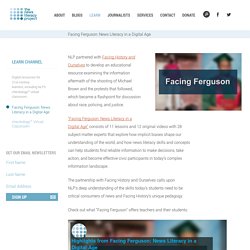
"Facing Ferguson: News Literacy in a Digital Age" consists of 11 lessons and 12 original videos with 28 subject matter experts that explore how implicit biases shape our understanding of the world, and how news literacy skills and concepts can help students find reliable information to make decisions, take action, and become effective civic participants in today’s complex information landscape.
The partnership with Facing History and Ourselves calls upon NLP's deep understanding of the skills today’s students need to be critical consumers of news and Facing History’s unique pedagogy. How Library Stuff Works: How to Evaluate Resources (the CRAAP Test) Academy of Art University. Evaluating Websites. Evaluating Resources. Evaluating Websites for Research: Process. 1.
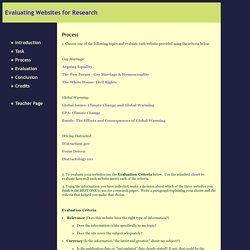
Choose one of the following topics and evaluate each website provided using the criteria below. Gay Marriage: Arguing Equality The Pew Forum - Gay Marriage & Homosexuality The White House- Civil Rights Global Warming: Global Issues- Climate Change and Global Warming EPA- Climate Change. Evaluating Sources for Credibility. Untitled. The Knight Commission report defines media literacy as "the capacity to access, analyze, evaluate, and create messages in a variety of media.”
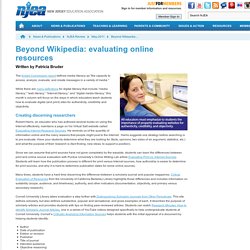
While there are many definitions for digital literacy that include “media literacy,” “web literacy,” “Internet literacy,” and “digital media literacy,” this month’s column will focus on the ways in which educators teach students how to evaluate digital (and print) sites for authenticity, credibility and objectivity. Creating discerning researchers Robert Harris, an educator who has authored several books on using the Internet effectively, maintains a page on his Virtual Salt website called Evaluating Internet Research Sources.
He reminds us of the quantity of information online and the many reasons that people might post to the Internet. Harris suggests one strategy before searching is to pre-evaluate. Many times, students have a hard time discerning the difference between a scholarly journal and popular magazines. Glogin?URI= SLMR EvaluatingInformation V2. Identifying Reliable Sources and Citing Them. Teaching Adolescents How to Evaluate the Quality of Online Information. An essential part of online research is the ability to critically evaluate information. This includes the ability to assess its level of accuracy, reliability, and bias. In 2012, my colleagues and I assessed 770 seventh graders in two states to study these areas, and the results definitely got our attention.
Unfortunately, over 70 percent of the students’ responses suggested that: Middle school students are more concerned with content relevance than with credibility They rarely attend to source features such as author, venue, or publication type to evaluate reliability and author perspective When they do refer to source features in their explanations, their judgments are often vague, superficial, and lacking in reasoned justification Other studies highlight similar shortcomings of high school and college students in these areas (see, for example, a 2016 study from Stanford). Inquiry on the Internet: Evaluating Web Pages for a Class Collection.
ReadWriteThink couldn't publish all of this great content without literacy experts to write and review for us.
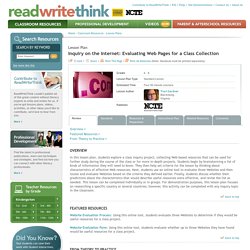
If you've got lessons plans, videos, activities, or other ideas you'd like to contribute, we'd love to hear from you. More Find the latest in professional publications, learn new techniques and strategies, and find out how you can connect with other literacy professionals. More Teacher Resources by Grade Your students can save their work with Student Interactives. More Home › Classroom Resources › Lesson Plans Lesson Plan Overview. Evaluating Internet Resources. How do I evaluate the quality of websites?
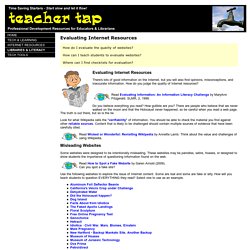
How can I teach students to evaluate websites? Where can I find checklists for evaluation? Evaluating Internet Resources There's lots of good information on the Internet, but you will also find opinions, misconceptions, and inaccurate information. 9 Resources for Website Evaluation Lessons. Nine days ago I published Beyond Google, an ebooklet designed to help teachers and students improve their Internet search results.
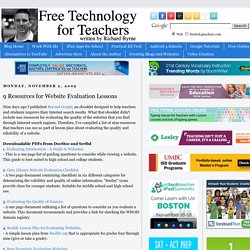
What that ebooklet didn't include was resources for evaluating the quality of the websites that you find through Internet search engines. Therefore, I've compiled a list of nine resources that teachers can use as part of lesson plan about evaluating the quality and reliability of a website. Downloadable PDFs from DocStoc and Scribd1. Evaluating Information - A Guide to Websites.- This is a one page list of guiding questions to consider while viewing a website.
This guide is best suited to high school and college students. 2. 3. 4. 5. Online Lessons and Activities6. 7. 8. For Brushing-up on Your Own Skills9. Evaluating Web Resources. Phil Nast, retired junior high school teacher and freelance writer Found in: language arts & literature, 3-5, 6-8, 9-12 Determining what makes a reliable Web resource for a research paper is an important student skill.

Here are three tutorials that propose criteria to establish resource suitability, in some cases using fewer or slightly different terms, each with useful advice and tips: Evaluating Internet Sources Tutorial is an audio slide presentation for students in grades 5-12 that outlines a skeptical approach to Web research. Critical Evaluation. Beginner & Intermediate 5: Evaluating credibility of sources - Documentos Google.
Advanced5Evaluatingcredibilityofsources. Evaluating Sources.